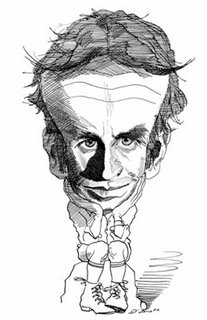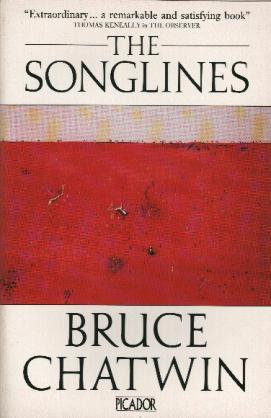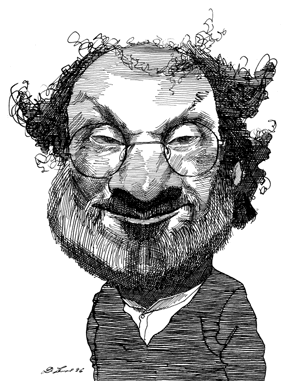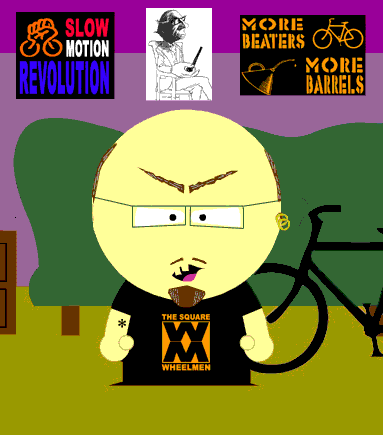The nomadic alternative
wandering and wondering
 Back in 2006, I posted a NYTimes op-ed piece by David Brooks eulogizing the passing of the old school, streetwise skeptics of the Chicago press corps. It, as well as comments from a couple of readers I wrote about in Second thoughts, reminded me of the author, Bruce Chatwin. Although he was sometimes careless with the facts, his writing reflected a connoisseur's fascination with the gritty details of people's lives around the world. I guess that's why I've been reading him recently after a ten year hiatus.
Back in 2006, I posted a NYTimes op-ed piece by David Brooks eulogizing the passing of the old school, streetwise skeptics of the Chicago press corps. It, as well as comments from a couple of readers I wrote about in Second thoughts, reminded me of the author, Bruce Chatwin. Although he was sometimes careless with the facts, his writing reflected a connoisseur's fascination with the gritty details of people's lives around the world. I guess that's why I've been reading him recently after a ten year hiatus. In 1989, I first read Chatwin's The Songlines. It was the year I started grad school at the Unieversity of Illinois in Urbana-Champaign. It was also the year he died of what I later learned was AIDS. Not that I was ignorant of HIV/AIDS back in those early days of the epidemic. My cousin, a virologist living in Macon, GA, had just appeared in a photo for the National Geographic Magazine HIV/AIDS cover story ... or at least his hands did. They were in a photo of a rural AIDS hospice where my cousin was examining the residents.
In 1989, I first read Chatwin's The Songlines. It was the year I started grad school at the Unieversity of Illinois in Urbana-Champaign. It was also the year he died of what I later learned was AIDS. Not that I was ignorant of HIV/AIDS back in those early days of the epidemic. My cousin, a virologist living in Macon, GA, had just appeared in a photo for the National Geographic Magazine HIV/AIDS cover story ... or at least his hands did. They were in a photo of a rural AIDS hospice where my cousin was examining the residents.Actually, the reason I was ignorant of Chatwin's illness is that he denied its cause until the last months of his life. Instead, he believed and convinced his family and closest friends that he had picked up a rare fungus in China. Even after it became apparent that this fungus was merely an opportunistic infection, Chatwin stoically refused to publicize his AIDS. His family and friends respected this silence.
 Chatwin's death is a tragedy in both personal and literary terms. Salman Rushdie, a close friend who joined him on a road-trip through central Australia, has said that his books and essays, all of which dealt with travel as a way of life, have changed the way writers write and readers read travel books. Chatwin wouldn't have agreed though. He hated being pegged as a travel writer. He thought of himself as a writer who simply happened to travel ... a lot and everywhere.
Chatwin's death is a tragedy in both personal and literary terms. Salman Rushdie, a close friend who joined him on a road-trip through central Australia, has said that his books and essays, all of which dealt with travel as a way of life, have changed the way writers write and readers read travel books. Chatwin wouldn't have agreed though. He hated being pegged as a travel writer. He thought of himself as a writer who simply happened to travel ... a lot and everywhere. Chatwin's great appeal for me lies in an apparent contradiction: he was a hedgehog with one big idea who pursued it like a fox. On the one hand, he believed that the nomads' travelling way of life is the natural state of humanity and having lost this for the most part, the world is now a more neurotic, violent place.
Chatwin's great appeal for me lies in an apparent contradiction: he was a hedgehog with one big idea who pursued it like a fox. On the one hand, he believed that the nomads' travelling way of life is the natural state of humanity and having lost this for the most part, the world is now a more neurotic, violent place. On the other hand, Chatwin rambled across six continents looking for this Nomadic Alternative. While many authors have written about exotic locales, from the comfortable security of their dens, Chatwin loved to visit them. Infamous for his non-stop, rapid chatter, he was yet a sensitive listener. He had intense discussions with a dizzying array of other travellers and writers as well as nomads, warriors, conquerors, cowboys, artists, shepherds, mystics, and mercenaries.
On the other hand, Chatwin rambled across six continents looking for this Nomadic Alternative. While many authors have written about exotic locales, from the comfortable security of their dens, Chatwin loved to visit them. Infamous for his non-stop, rapid chatter, he was yet a sensitive listener. He had intense discussions with a dizzying array of other travellers and writers as well as nomads, warriors, conquerors, cowboys, artists, shepherds, mystics, and mercenaries.No matter how prickly or cautious the people he met, he wore down their defenses. No matter how confusing or murky the setting, he figured out what was really going on. Ultimately, Chatwin is an incredible storyteller; he combines the facts he observed with a brilliant imagination in a wholly novel and compelling way.
 So I've returned to Bruce Chatwin as I write this blog. It seems to me that he offers a natural bridge between travel as a way of life and bikes as a means for travel. In purely Chatwinesque fashion, he asks questions... the right questions:
So I've returned to Bruce Chatwin as I write this blog. It seems to me that he offers a natural bridge between travel as a way of life and bikes as a means for travel. In purely Chatwinesque fashion, he asks questions... the right questions:Why is man the most restless, dissatisfied of animals?
Why do wandering people conceive the world as perfect whereas sedentary ones always try to change it?
Why have the great teachers - Christ or the Buddha - recommended the Road as the way to salvation?
Do we agree with Pascal that all man's troubles stem from his inability to sit quietly in a room?
 All I got to do now is answer them
All I got to do now is answer themby pointing my bike
in the right direction.
Yeah, yeah ...
it's a corny ending, I know %)
Labels: books, Isaiah Berlin, worldbeat







1 Comments:
I just want to say that It was very good post, it helped me in finding a good affiliate,
Post a Comment
<< Home